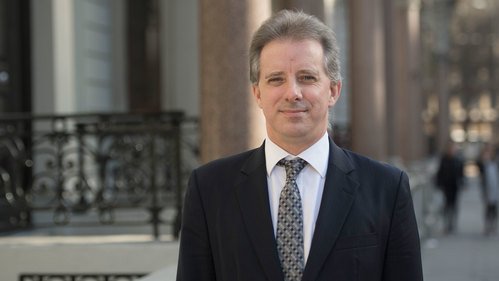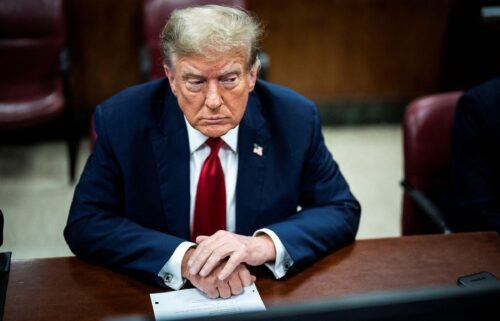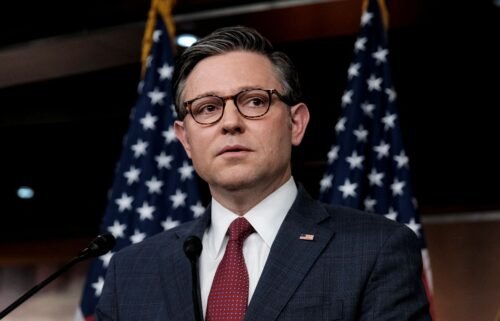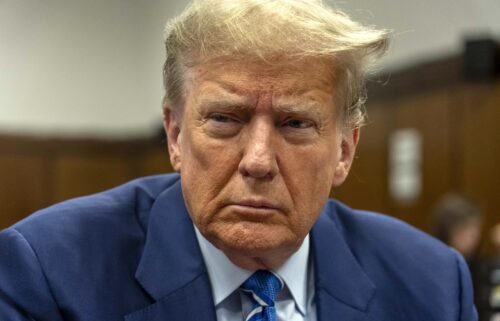How the FBI attempted to verify a salacious allegation in the Steele dossier

The Justice Department inspector general’s report released Monday paints a more thorough picture than ever before on what the FBI found when it tried to verify information in Christopher Steele’s dossier on Donald Trump and Russia — including attempts to verify the existence of video tapes of “alleged unorthodox sexual activity.”
Steele’s primary source for information in the dossier, for instance, told the FBI he or she may have talked about Trump’s alleged sexual activities in “jest” and couldn’t confirm whether the tape was real, the report states, quoting the source.
“The Primary Sub-source explained that he/she reported to Steele that Trump’s alleged unorthodox sexual activity at the Ritz Carlton hotel was ‘rumor and speculation’ and that he/she had not been able to confirm the story,” the report states.
Many of the claims by Steele, a former British spy, have held up over time, or have proven to be at least partially true, including the fact that there was a concerted Russian operation to attacking the 2016 US election. The Justice Department has brought criminal charges against dozens of Russian hackers and online trolls for allegedly interfering with the election.
Steele’s dossier had also asserted that Trump could be vulnerable to Russian blackmail, among other things. The salacious allegations in Steele’s memos remain unproven, nearly three years after the memos went public — a point which the Horowitz report on Monday underlines.
The report on Monday gives a thorough retelling of FBI officials’ traveling abroad to interview Steele and a source of his and to keep track of allegations raised in the dossier in a spreadsheet. Inspector general Michael Horowitz described an extensive effort by the FBI to learn about Steele’s sources and interview his primary source.
Steele’s primary source on the dossier told the FBI that Steele “misstated or exaggerated” his or her statements in the dossier, according to the inspector general’s report. “The FBI conducted interviews of [Steele’s] Primary Sub-source in January, March, and May 2017 that raised significant questions about the reliability of the Steele election reporting,” the report adds.
Determining how the FBI used Steele’s work and vetted it became key to the Justice Department inspector general this year, as inspector general Michael Horowitz looked into how the FBI cited Steele’s dossier when it sought surveillance of former Trump adviser Carter Page.
Horowitz notes some of the information Steele collected could have been disinformation planted by the Russians. The inspector general didn’t attempt to vet this possibility, because it was outside of his office’s scope, Horowitz wrote.
(The Mueller report previously acknowledged the rumor of tapes of Trump existing but did not go into detail any findings about them.)
How the FBI vetted the Steele dossier
At first, when the FBI was communicating with Steele, FBI leadership told the CIA they believed him to be a reliable source. Then-FBI official Andrew McCabe, now a CNN analyst, was pushing for the intelligence agencies to take Steele’s reports on Trump seriously but his “view did not prevail,” Horowitz wrote.
Steele had briefed the left-wing magazine Mother Jones about his work in October 2016, causing murmurs about the dossier to begin to circulate publicly. Because of this Mother Jones story, FBI stopped using Steele as a source, Horowitz noted.
Beginning in mid-November 2016, the effort to verify the dossier began, Horowitz said. Peter Strzok and Bill Priestap — then-FBI officials leading the Crossfire Hurricane investigation — went abroad on the first trip, and Strzok, Lisa Page and others traveled abroad in December 2016. The investigators heard positive remarks from people who worked with Steele and also negative comments about him having poor judgment.
“He was the type of person who would sometimes follow the shiny object without, perhaps, a deep set of judgment about the risk that may or may not be there in terms of following the shiny object. But in any event, he was not the type of person who would fabricate something or make something up or mischaracterize it, either intentionally or unintentionally,” Strzok had told Horowitz during the inspector general’s review.
The FBI continued to evaluate Steele’s information into 2017.
At one point, the Crossfire Hurricane investigators created a spreadsheet with each of Steele’s statements in the dossier to keep track as it vetted them. Some of the information was verified through publicly available information—though much of Steele’s work couldn’t be verified.
That’s because some of the details would have had to come from high-level people in Russia, Strzok had said, or from just a few people who witnessed meetings, Horowitz noted.
Horowitz also noted that some of the details from the dossier were untrue, such as the allegation that Michael Cohen traveled to Prague in 2016 to meet with Russians. (Mueller previously asserted in his report that Cohen had never traveled to Prague, citing Cohen’s repeated statements that he had not.)
Steele’s counterintelligence and election information in the dossier hadn’t come into the FBI from another source, so the FBI’s validation unit considered it to be uncorroborated. Horowitz recommended on Monday that the FBI should evaluate how the FBI validates reporting from its sources. FBI Director Chris Wray agreed with the recommendation and said it would made changes, according to his responses to Horowitz included in the report.
The FBI also interviewed Steele in September 2017 over two days, Horowitz wrote. After the last Page FISA warrant application went to the foreign surveillance court with mention of Steele’s work in it, the FBI found that Steele had become biased against Trump, the inspector general found.
“The FBI discovered discrepancies between Steele’s reporting and statements sub-sources made to the FBI, which raised doubts about the reliability of some of Steele’s reports. The FBI also assessed the possibility that Russia was funneling disinformation to Steele, and the possibility that disinformation was included in his election reports,” Horowitz wrote.
“The FBI concluded, among other things, that although consistent with known efforts by Russia to interfere in the 2016 U.S. elections, much of the material in the Steele election reports, including allegations about Donald Trump and members of the Trump campaign relied upon in the Carter Page FISA applications, could not be corroborated; that certain allegations were inaccurate or inconsistent with information gathered by the Crossfire Hurricane team; and that the limited information that was corroborated related to time, location, and title information, much of which was publicly available.”




